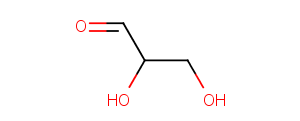DL-Glyceraldehyde
| Code | Size | Price |
|---|
| TAR-T4918-1mL | 1 mL * 10 mM (in DMSO) | £107.00 | |||||||||||||||||||||||||||||||||||||||||||||||||||||||||||||||||||||||||||||||||||||||||||||||||
| Special offer! Add £1 to your order to get a TargetMol CCK-8 Kit. Read more here. | |||||||||||||||||||||||||||||||||||||||||||||||||||||||||||||||||||||||||||||||||||||||||||||||||||
Quantity:
| TAR-T4918-10mg | 10mg | £109.00 | |||||||||||||||||||||||||||||||||||||||||||||||||||||||||||||||||||||||||||||||||||||||||||||||||
| Special offer! Add £1 to your order to get a TargetMol CCK-8 Kit. Read more here. | |||||||||||||||||||||||||||||||||||||||||||||||||||||||||||||||||||||||||||||||||||||||||||||||||||
Quantity:
| TAR-T4918-25mg | 25mg | £132.00 | |||||||||||||||||||||||||||||||||||||||||||||||||||||||||||||||||||||||||||||||||||||||||||||||||
| Special offer! Add £1 to your order to get a TargetMol CCK-8 Kit. Read more here. | |||||||||||||||||||||||||||||||||||||||||||||||||||||||||||||||||||||||||||||||||||||||||||||||||||
Quantity:
| TAR-T4918-50mg | 50mg | £162.00 | |||||||||||||||||||||||||||||||||||||||||||||||||||||||||||||||||||||||||||||||||||||||||||||||||
| Special offer! Add £1 to your order to get a TargetMol CCK-8 Kit. Read more here. | |||||||||||||||||||||||||||||||||||||||||||||||||||||||||||||||||||||||||||||||||||||||||||||||||||
Quantity:
| TAR-T4918-100mg | 100mg | £208.00 | |||||||||||||||||||||||||||||||||||||||||||||||||||||||||||||||||||||||||||||||||||||||||||||||||
| Special offer! Add £1 to your order to get a TargetMol CCK-8 Kit. Read more here. | |||||||||||||||||||||||||||||||||||||||||||||||||||||||||||||||||||||||||||||||||||||||||||||||||||
Quantity:
| TAR-T4918-200mg | 200mg | £277.00 | |||||||||||||||||||||||||||||||||||||||||||||||||||||||||||||||||||||||||||||||||||||||||||||||||
| Special offer! Add £1 to your order to get a TargetMol CCK-8 Kit. Read more here. | |||||||||||||||||||||||||||||||||||||||||||||||||||||||||||||||||||||||||||||||||||||||||||||||||||
Quantity:
| TAR-T4918-500mg | 500mg | £428.00 | |||||||||||||||||||||||||||||||||||||||||||||||||||||||||||||||||||||||||||||||||||||||||||||||||
| Special offer! Add £1 to your order to get a TargetMol CCK-8 Kit. Read more here. | |||||||||||||||||||||||||||||||||||||||||||||||||||||||||||||||||||||||||||||||||||||||||||||||||||
Quantity:
Prices exclude any Taxes / VAT
Overview
Regulatory Status: RUO
Shipping:
cool pack
Storage:
-20℃
Images
Documents
Further Information
Bioactivity:
Glyceraldehyde is produced from the action of the enzyme glyceraldehyde dehydrogenase, which converts glycerol to glyceraldehyde using NADP as a cofactor. When present at sufficiently high levels, glyceraldehyde can be a cytotoxin and a mutagen. A cytotoxin is a compound that kills cells. A mutagen is a compound that causes mutations in DNA. Glyceraldehyde is a highly reactive compound that can modify and cross-link proteins. Glyceraldehyde-modified proteins appear to be cytotoxic, depress intracellular glutathione levels, and induce reactive oxygen species (ROS) production (PMID: 14981296 ). Glyceraldehyde has been shown to cause chromosome damage to human cells in culture and is mutagenic in the Ames bacterial test.
CAS:
56-82-6
Formula:
C3H6O3
Molecular Weight:
90.078
Pathway:
Endocrinology/Hormones; Metabolism
Purity:
0.9588
SMILES:
OCC(O)C=O
Target:
Reductase
References
Gugliucci A . A practical method to study functional impairment of proteins by glycation and effects of inhibitors using current coagulation/fibrinolysis reagent kits[J]. Clinical Biochemistry, 2003, 36(2):155-158.
Beard K M , Shangari N , Wu B , et al. Metabolism, not autoxidation, plays a role in alpha-oxoaldehyde- and reducing sugar-induced erythrocyte GSH depletion: relevance for diabetes mellitus.[J]. Molecular & Cellular Biochemistry, 2003, 252(1-2):331-338.



